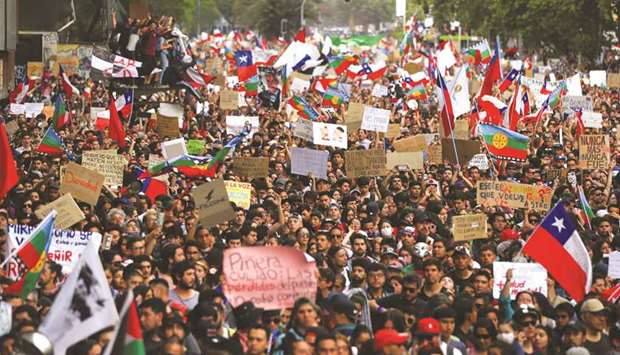Chilean President Sebastian Pinera said yesterday he would shake up his cabinet to quell a week of mass protests against inequality that have rocked the South American nation.
His announcement follows a peaceful rally on Friday that saw 1mn Chileans flood the streets to call for reforms to the country´s social and economic model.
“I have put all my ministers on notice in order to restructure my cabinet to confront these new demands,” Pinera told reporters from the La Moneda presidential palace.
Pinera did not announce the specifics of the reshuffle, nor did he say when he would announce them.
A document obtained by Reuters, however, suggested Pinera was considering replacing the heads of at least nine ministries, including the ministries of interior, defence, economy, transportation and environment.
Protests in Chile began over a hike in subway fares more than a week ago but boiled into riots that have killed at least 17 people, resulted in more than 7,000 arrests and caused more than $1.4bn of losses to Chilean businesses.
The centre-right Pinera, a billionaire businessman, called for a new “social pact,” earlier in response to protesters’ demands.
He has promised to boost the minimum wage and pensions, ditch fare hikes on public transportation and fix the country’s ailing health care system.
The riots prompted Pinera to declare “war” on vandals and put the military in charge of security across much of the country.
Santiago has been on lockdown every night this week, with strict curfews enforced by thousands of heavily armed soldiers on the streets.
The move sparked outrage among many in Chile, who said his words and actions harkened back to the grim era of military rule under dictator Augusto Pinochet.
Speaking with reporters yesterday morning, Pinera said he would lift the state of emergency today evening at midnight “if circumstances allow.”
Chile´s military said yesterday the city “had tended to normalcy...thanks to the contribution of all of its citizens,” adding it would not enforce a curfew later yesterday.
“We are in a new reality,” Pinera said. “Chile is different from what it was a week ago.”
One of the most controversial members in the current cabinet is Interior Minister Andres Chadwick, the president’s cousin.
The police and army troops have been accused of using unnecessary force in putting down the protests.
The United Nations is sending a team to investigate allegations of abuse.
On Friday, demonstrators carrying indigenous and national flags sang popular resistance songs from the 1973-90 Augusto Pinochet dictatorship era.
Santiago’s governor Karla Rubilar praised the march, saying it represented “the dream of a new Chile.”
Police said 820,000 people marched in the capital.
For the past week, pent-up anger has erupted over a socio-economic structure that many feel has left them by the wayside, with low wages and pensions, costly health care and education, and a big gap between rich and poor.
The protesters’ demands now includes not only better social benefits but also the scrapping and replacing of the nation’s Constitution, which dates from the Pinochet dictatorship.
Francisco Anguitar, a 38-year-old software developer attending the demonstrations Friday, told AFP: “We’re asking for justice, honesty, ethical government. It’s not that we want socialism or communism.”
In an initial burst of violence, metro stations were destroyed, supermarkets torched and looted, traffic lights and bus shelters smashed, and countless street barricades erected and set alight.
The national human rights institute INDH said 584 people have been injured and 2,410 detained during the protests.
Authorities deployed some 20,000 police and soldiers in Santiago, using tear gas and water cannons to disperse demonstrators.
Soldiers have been guarding Santiago’s metro stations as three of the seven lines — which usually carry 3mn people per day — have reopened.
Despite a recent decrease in serious incidents and arrests, the violence has been the worst since Chile returned to democracy after the Pinochet dictatorship.
The movement still lacks recognisable leaders and was mostly roused through social media, which analysts say makes it harder for the government to negotiate any resolution.

Demonstrators march during a protest against Chile’s state economic model in Santiago on Friday.
